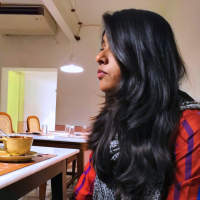View this post on Instagram
{*Did you know you can write on Elephant? Here’s how—big changes: How to Write & Make Money or at least Be of Benefit on Elephant. ~ Waylon}
I have had a terrible relationship with money all my life.
It was the source of all evil. If lack of it was bad, having enough was worse.
Not only that, I hated anyone who talked about it. My mind instantly put them on the blacklist. I used to scoff at the ones who preached about retirement funds and savings.
My personal history can tell the story why:
I grew up poor, but not in poverty. I was unfortunate on occasions but not enough to grieve the lack of certain luxuries in life. I was comfortable enough, which meant asking for more—more food, more clothes, more education—was a sign of greed.
I am the middle child out of three daughters in a “middle class” family. As a kid, I didn’t have toys or clothes that were solely mine. I could have hobbies as long as they was free. We never dined out, and buying snacks was a monthly luxury. Our idea of vacation was visiting our grandparents and never farther than that.
We were allowed to dream as long as it didn’t cost anything.
The problem was not that we were poor, but we were poor inside the walls of our house. Outside, we had a reputation. Everyone assumed we were well-off. We had everything we needed. We were constantly reminded how grateful we should be for our progressive father who was “raising and educating three girls who aren’t going to take care of him in his old age.” While our classmates were taking advantage of benefits and scholarships, we were muscling through with whatever was left. Because those are reserved for the ones in need. And we were not one of them.
So, money became my enemy. It was the monkey on my back I was trying to desperately get rid of.
Most who grow up poor strive never to be in that position again. They want to earn more and save more.
I was the opposite.
Earning money was not a problem for me. But saving it? I was adamant that I wouldn’t even look at my bank balance. Every time I reached for my card, the words echoed in my mind, “we need to save for the future.”
I hated money. I hated this hypothetical idea of the future. And I hated planning for it.
I didn’t realise how much this hatred drove me. When I got my first job, I couldn’t bear the sight of the growing digits in my bank account. At first, it was relieving. I could finally do the things I wanted, and pamper myself a bit.
But the numbers needed to be gone.
I preferred living paycheck to paycheck.
If there was money left in my account, I went on a shopping spree. Thankfully, I only ever spent it on people I love—my mother, my sisters, my friends. I gave it away to people who needed it more. “I know I can count on her” became the slogan my friends and family used around me.
My loved ones were happy. I was living in comfort. I was enjoying the little pleasures I was denied as a kid. But…the intentions felt wrong.
It was painful, but I had to zoom out to see the full picture. It wasn’t hard to see that I was booking a one-way ticket to self-sabotage. My future lay somewhere between unpredictable and inevitably stressful. And a part of me was unsatisfied.
That wasn’t the worst realisation.
Money was puppeteering my life. I was still rebelling against the voices in my head that said spending money on myself was a waste of resources. I was willing to implode my life to prove some strangers wrong.
Here’s the truth I came to discover: money is neither good nor evil. It is a tool to help us survive.
I didn’t hate money.
I hated how it was wielded against me.
As an adult, I now choose how I wield it. I can indulge a little and save a lot. Caring for myself and making my life comfortable is what money is for.
Others can accuse me of greed, but it doesn’t matter. No one can judge me for what I do except myself. It’s my life, my money, my choices.
If you have a love-hate relationship with money, my advice is to start where you are. Check your feelings around it and your actions. Then, dig deep.
Apparently, we understand basic concepts about money and our values are formed as early as between the ages of three and seven.
Start there. What did you believe about money as a child?
~
{Please consider Boosting our authors’ articles in their first week to help them win Elephant’s Ecosystem so they can get paid and write more.}











Read 2 comments and reply